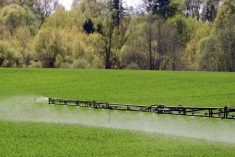HAMBURG (Reuters) – Julia Kloeckner, a senior figure in Chancellor Angela Merkel’s conservative CDU party, on Wednesday took over as agriculture minister in Germany’s new government coalition.
Kloeckner replaces Christian Schmidt of the southern conservative CSU party as the new government takes office after almost six months of coalition negotiations.
Kloeckner expects European Union agricultural policy to be a major theme in her new office, she told German television channel n-tv. The EU faces a spending crunch as net financial contributor Britain leaves the bloc.
Read Also

Alberta crop conditions improve: report
Varied precipitation and warm temperatures were generally beneficial for crop development across Alberta during the week ended July 8, according to the latest provincial crop report released July 11.
She also cited consumer protection, animal welfare and maintaining competitiveness of German agriculture as priorities.
Schmidt had been expected to be replaced after his decision in November to back an EU proposal to permit use of the weed-killerglyphosate for five years, despite a heated debate over whether it causes cancer.
Kloeckner, 45, is one of a series of younger ministers named by Merkel after months of political deadlock following Germany’s inconclusive elections in September.
Kloeckner, a journalist, is a deputy chairperson of Merkel’s CDU party and a former deputy agriculture minister.
She was credited with negotiating the agriculture section of coalition deal for the new government. The deal contains a goal of ending glyphosate use as a weed-killer in Germany, but gives no timetable. Alternatives must be developed first, the agreement says.
Other agricultural policies agreed for the new government include a continuation of the ban on growing crops with genetically modified organisms (GMOs) in Germany and an expansion of organic farming.
An animal welfare food label will also be introduced for meat produced using farming methods with high care standards.
















